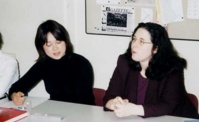
Chizuki Watanabe writes about Liz Pike's visit in 2001:

Ms. Elizabeth Pike visited us on the fifth of October, 2001. This was the second visit to our university for her. Last year around this time she came to our class to talk about the British Council where she works as an assistant manager. This time she focussed on her career. Her job seems quite interesting and asks for positive attitudes. Everyday is different for her. She does a lots of different things every weekday. Nagoya office where she works is one of five offices in Japan. They all go for the same goal. One of her interesting jobs for me is organizing events. This part sounded like her favorite part of the job, too. She works together with other people, planning events, publishing, making reservations for visitors and helping them to stay in Japan while the events go on. I am sure that she feels very satisfied when the event achieves a great success.
When she was 18 years old she took a gap year before studying at university. She took part in a volunteer organization and was sent to Indonesia. She worked as an English teacher for blind students or all kinds of disabled students. At the beginning it was very hard for her, she said. She continued because she had to find how to teach English for them from nowhere. There was not much support. No one had really made the effort to teach English to those kinds of students. As many nights that she spent for crying passed she was getting a hope that she could create her own way to teach!! She changed her attitude then and became able to enjoy teaching English them using music and other materials. It was also the first time that she knew about the presence of the British Council.
After spending a year to teach English in Indonesia she entered a university. She took English literature for a while. But she changed her major to Social Anthology because experience in Indonesia gave her interests in how the role of cultures has connections to the development of society. After she graduated from her university she came to Japan to teach English in Shizuoka. She taught English for two years at a high school. At that time she was a bit disappointed because Japan not longer seemed to have as unique a culture as she had expected before. After finishing working at high school she stayed working at an education center. There she helped people to understand other cultures. She feels it is very important to tell people to get to know about their own culture before they look at other countries. She thinks that being international does not only mean speaking English but also knowing your own country.